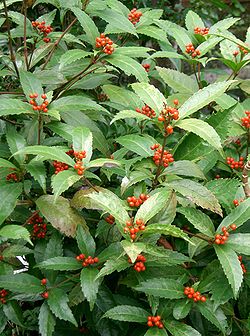Sarcandra glabra
You can help expand this article with text translated from the corresponding article in Chinese. (March 2015) Click [show] for important translation instructions.
|
| Sarcandra glabra | |
|---|---|

| |
| Sarcandra glabra | |
| Scientific classification | |
| Kingdom: | Plantae |
| Clade: | Tracheophytes |
| Clade: | Angiosperms |
| Order: | Chloranthales |
| Family: | Chloranthaceae |
| Genus: | Sarcandra |
| Species: | S. glabra
|
| Binomial name | |
| Sarcandra glabra | |
| Synonyms[1] | |
|
List
| |
Sarcandra glabra is a herb native to Southeast Asia. It is also known as herba sarcandrae or glabrous sarcandra herb. Its common names include the nine-knotted flower and the bone-knitted lotus.[2]
Aromatic oils may be extracted from the leaves. This extract has been shown in mice to reduce immunologic attenuation due to stress.[3]
Morphology
[edit]This article may be confusing or unclear to readers. (June 2022) |
Leaf blade elliptic or ovate-lanceolate, 6–17 × 2–6 cm, leathery, margin sharply coarsely-serrate. Stamen baculate to terete; thecae shorter than connective. Stigma subcapitate. Fruit globose or ovoid, 3–4 mm in diam.[4]
Distribution
[edit]
The plant is distributed in Vietnam, Sri Lanka, Taiwan, Cambodia, Malaysia, India, Japan, Korea, the Philippines and, in China (Jiangxi, Anhui, Fujian, Guizhou, Guangxi, Hong Kong, Hunan, Sichuan, Yunnan, Guangdong, Zhejiang and other places), growing at an altitude of 420 meters to 1,500 meters, often growing on wet slopes and in shaded valleys.
Use in Japanese culture
[edit]The plant is used during Japanese New Year for chabana decoration, normally along winter jasmine.[5][6] Others plants used instead of Sarcandra glabra because of its similarity to it are coralberry trees and Ardisia japonica.[5]
References
[edit]- ^ The Plant List: A Working List of All Plant Species, retrieved 7 January 2017
- ^ "Sarcandra glabra (Bone-knitted Lotus, Caoshanhu, Glabrous Sarcandra Herb, Nine-Knotted Flower) | North Carolina Extension Gardener Plant Toolbox". plants.ces.ncsu.edu. Retrieved 2024-12-12.
- ^ He, RR; Yao, XS; Li, HY; Dai, Y; Duan, YH; Li, YF; Kurihara, H (2009). "The anti-stress effects of Sarcandra glabra extract on restraint-evoked immunocompromise". Biol. Pharm. Bull. 32 (2): 247–52. doi:10.1248/bpb.32.247. PMID 19182384.
- ^ Nianhe Xia; Joël Jérémie (1999), "Sarcandra Gardner, Calcutta J. Nat. Hist. 6: 348. 1845", Flora of China, vol. 4, pp. 132–138
- ^ a b "万両 千両 十両の見分け方 和風の自然な庭に似合う植物(12月)です - Hanana tree". 17 December 2017.
- ^ "千両/万両 せんりょう/まんりょう|暦生活".
